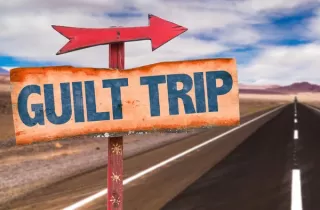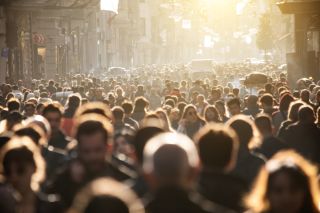Guilt
Guilt Trip: Is This Emotion Driving Your Life?
We can collectively learn from guilt.
Updated January 28, 2024 Reviewed by Jessica Schrader
Key points
- Guilt is driving our lives; let’s get to know the driver.
- Guilt and shame can be toxic and also helpful in building empathy.
- Acknowledging guilt can create awareness of its role and diminish its overpowering presence.

Guilt travels with many of us, whether we invite it along or not. Its sister, shame, is just as eager to weasel in, often deluding and diluting elf-esteem. Whether speaking in whispers or demanding your attention loudly, when guilt speaks, it is often heard not only by those listening but also by those people closest to you and society at large.
Guilt can be appropriate or irrational, essentially healthy or unhealthy, and when pervasive, it can cause undue stress and waste our energy. Parents and children experience guilt. Students with excessive study habits experience it. Overworked employees and educators feel its heavy hand. For our own mental well-being and physical health, we must evaluate our levels of blameworthiness and reexamine shame's insidiousness.
And yet, without these deep-seated inclinations, it would be difficult for individuals or groups to extend empathy to each other. Morally bound by a sense of wrongdoing, humans, from the time they are toddlers, experience guilt. Feelings of guilt are intrinsic but can also engender prosocial behaviors, causing reflection and growth, personally, in groups and across sectors. Feeling bad or sorry can motivate selflessness, service, and kindness.
So, how can we know when guilt has taken us for the right ride?

Signals associated with guilt can vary from nonverbal cues to interpersonal difficulties and, in excess, is even linked to depression. In order to better understand or ease our own sense of responsibility, we must first know what we are looking for.
Can we name guilt when it appears?
Yes, if we are looking to see it clearly and actively seek to change its effects on us. Guilt is a self-evaluative or self-conscious emotion, as is shame. You must evaluate and reflect on your thoughts and behaviors to experience them, even in a rudimentary or unconscious sense. Remorse and recompense are tied to feelings of guilt, and persons without such feelings may reveal some level of inhumanity or psychopathy.
While feeling guilt may indicate that we at least have principles and a moral compass, these deep emotions can manifest toxically and impact our health and relationships. Often, the only way to gain an accurate measure of our culpability is to seek counsel or therapy to discover and reconcile guilt's root causes.
Upbringing, culture, parenting, religion, relationships, emotional manipulations, and domestic abuse all use guilt to bring about desired outcomes.
How do our culture and society utilize and collectively experience guilt? First, we must explore where guilt lives in society.
According to the American Psychological Association, in guilt cultures, there is "a trend or organizing principle in a society characterized by the use of guilt to promote socially acceptable behavior." APA describes shame culture as "a trend or organizing principle in a society characterized by a strong desire to preserve honor and avoid shame."
Living in either culture, one cannot escape all overriding themes and pressures. Guilt, becoming better known and understood by individuals and within cultures, sects, ethnicities, and even at the government or corporate level, shifts our perceptions and attitudes. Groups experience collective guilt based on historical or situational events, which can embed into the culture over time and create change through the arts, in legislative or corporate decision-making, through grants and educational opportunities, in campaigns, and even then filtering into our marketing, promotion, and media coverage.
As an example, American culture has recently centered guilt around racial divides and indigenous populations with significant media, educational, and corporate impact in ways we are all subject to. Then, think about some regularly used phrases such as "Catholic guilt" and "Jewish guilt."
Consider societal concerns over contributing to wastefulness, littering and not recycling, not reading enough literature, and lack of charitable giving as examples of commonly accepted implications. In many of these examples, innocence versus guilt or religious "sin" are driving cultural narratives. How does this layering of personal and public guilt affect us?
Survivor's guilt is better understood as being felt by those experiencing post-traumatic syndrome disorder (PTSD) and can occur in benign or catastrophic circumstances. Whether a person has survived a family illness or accident, outlived a sibling with a chronic condition, survived a classmate in a school shooting, or a police or soldier survived a military advance or criminal instance where a partner did not, the opportunities to experience regret are manifold.
Research around guilt is taking us into deeper territory to see how these experiences manifest in juveniles and in those suffering from depression, denial, or anger. With guilt affecting so many areas of our private and public lives, specific case studies and newer cross-cultural studies are being conducted to understand its wide-ranging ramifications on groups, and it seems the next logical step must be to individually acknowledge its place in the many facets of our lives. Once we begin to understand its weighty cloak on us, only then can the layers be peeled back to see if they are worthy of wearing.
Understanding how we are connected to each other through guilt may be the shift necessary in learning how to manage it.
Acknowledging and coming to terms with these feelings can be disquieting as we consider our feelings and what experiences, words, or deeds may have precipitated them. Accessing the origins of our perceptions (or lack of perceptions) around guilt can leave us quite emotionally uncomfortable. In times of discomfort, a reflex may be to assign blame to others or deny strong sentiments. While it does not feel good, guilt and shame can do good.
By recognizing guilt in our lives, we may be able to build upon empathetic responses to encourage future behaviors that might alleviate or mitigate the overwhelming negativity of guilt-ridden emotions, individually and collectively.

While guilt cannot be banished, it can be repressed or expressed. Can we talk back to that overpowering backseat driver in our lives?
Can we shape these dark emotions into something lighter that can work for us? Becoming aware of feelings by naming them and describing their emotional impact at an early age may embolden future generations on a more self-actualized path.
Guilt begets shame begets guilt. This is the cycle of guilt. What if that cycle were spun in another direction toward acknowledgment, acceptance, and awareness, begetting more acknowledgment, acceptance, and awareness?
Until that monstrous cycle is broken within ourselves, we will be easily subject to our own devaluation, low self-esteem, fear-mongering, control tactics, and differing stances on good versus evil. Guilt entrenches our positions, sinks its teeth into our responses, and sucks at our energy.
However, as we face this powerful force, we must also understand how it has been wielded, to wield it better, and to see it for the bully it has become.
Only then can we drive a stake of holly through its heart.
References
https://www.ncbi.nlm.nih.gov/pmc/articles/PMC8768475/
https://royalsocietypublishing.org/doi/10.1098/rsos.200617
https://www.ncbi.nlm.nih.gov/pmc/articles/PMC10590163/#
https://www.sciencedirect.com/science/article/abs/pii/S0363811117300243
https://royalsocietypublishing.org/doi/10.1098/rsos.200617
https://www.mdpi.com/2077-1444/11/8/420




